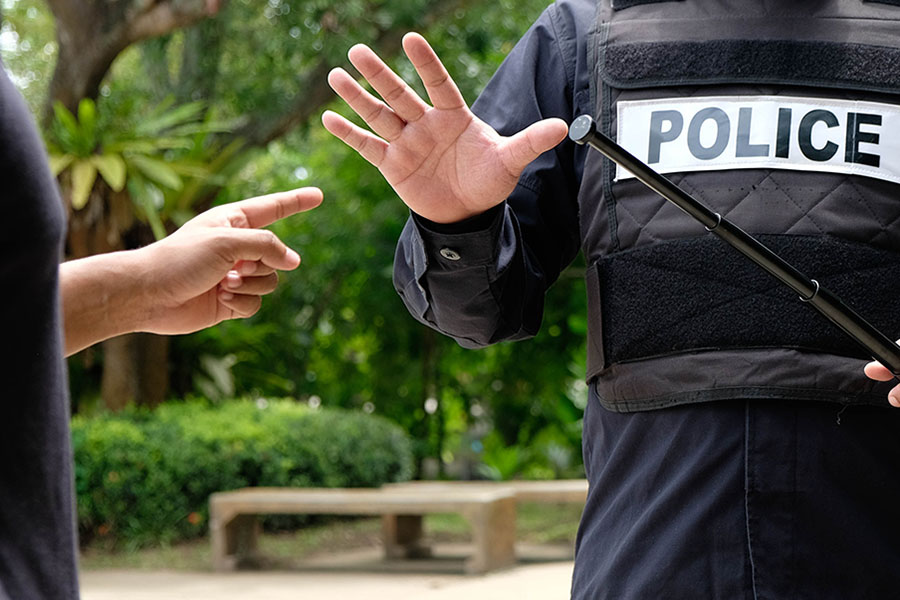Swirling with despair over your loved one’s death, we support your anger towards the unjust officer.
It is one thing for a doctor to slip the scalpel or a skyscraper railing to fail. But it is arguably far worse trauma to die at the hands of someone tasked to uphold the law and protect your loved one.
Most of the time, the officer may have inadequate training or ignore standard protocol, making your family pay in the end.
We despise hypocritical police actions and desire to give you power over what may seem like a powerless situation. Using case evidence and advocating for Constitutional rights, you can refuse to allow this tragedy to defeat your family.
Most police brutality cases escalate into homicide, so this information is also useful if you need to file a criminal lawsuit.
Whether you are the one suing on behalf of the loved one or you are a relative, we want to explain more about wrongful death lawsuits by the police.
Filing for Police Brutality Wrongful Death: State or Federal Court?
A barrier to seeking a wrongful death petition for police misconduct is knowing which court you should approach.
While there are distinct factors for state and federal levels, a civil rights attorney may interpret your case one way or the other.
For example, you have the ability to file a police brutality case that violates state law. But it could escalate it to federal law too because those courts also have jurisdiction over the case.
Your family could lose precious testimonies and records crucial to supporting the case if you don’t petition it correctly, regardless of which court it is.
Most evidence disappears soon after the death, so you don’t have time to waste filing to the wrong entity. That can create major consequences in your civil rights case moving forward.
Filing in State Court
These police brutality cases rest on wrongful death argumentation, which is that an officer’s negligence resulted in your loved one’s death.
This is similar to any other wrongful death lawsuit, including medical malpractice, product liability, and many others.
Filing in state court means the judge would determine the duties of care or the responsibilities the police department owed your family member or friend. Then, they would collect the physical and emotional/mental damages the family has suffered.
Ultimately, the state court would award your family a settlement covering those damages, so you don’t have to pay for the tragic financial ramifications.
Filing in Federal Court
The other way to petition for a civil rights case is to file in federal court. When a police officer transgresses your loved one’s Constitutional rights, it becomes a national offense.
One common instance is when a law enforcement member racially profiles a friend or relative, resulting in a police shooting. While the death could have been accidental, the officer violated your loved one’s civil rights and humanity.
Judges are careful when selecting cases that make it to federal court since there is a higher demand for lawsuits to escalate.
They have stricter guidelines for the case to qualify, and there is often a waiting period to see whether the government approves or not.
Police Civil Right Violations in Wrongful Death
If you find yourself trapped in a federal lawsuit for police brutality, an experienced lawyer will become an invaluable asset.
They deeply understand the Constitution and its direct and indirect implications for contemporary America. Specific laws can be challenging to interpret, but a wrongful death attorney has classical training in fighting for your family.
In general, they often reference the 4th and 14th Amendments and Ku Klux Klan Act to give you power and standing in the lawsuit.
4th Amendment: Unlawful Searches & Seizures
What began as the early American mantra against British tyranny has extended to the oppressive acts that officers do to victims. They have no right to use deadly force unless it is absolutely necessary.
The 4th Amendment is particular about what causes a “seizure” under the law. It explains that an officer seizes the victim when “by means of physical force or a show of authority, his freedom of movement is restrained.”
This change to the Constitution becomes complex since a seizure means much more than restricting movement in a wrongful death case.
14th Amendment: Equal Treatment Under the Law
This Constitutional law protects all US citizens under the law, including those of every race, color, class, gender, etc.
Although the amendment failed to guarantee equal civil rights at the time, police brutality lawyers use it now as an outcry for justice.
The George Floyd case is a keen example of officers harboring active racism. This clouds their judgment and produces horrific acts of violence and murder against innocent people.
Title 42, Section 1983, Civil Rights Act of 1871
President Ulysses S. Grant enacted what was known at the time as the Ku Klux Klan Act to shut down terrorist killings of blacks and other oppressed groups.
Many experienced civil rights attorneys understand the same law applies today in deaths caused by police officers.
Get Justice for Your Loved One from Police Killings
No one deserves to die at the hands of a law enforcement officer, especially if they did so by violating their fundamental human rights.
You need an experienced team when the government gives officers a pass with cases involving qualified immunity or “internal investigations” covering up their guilt.
Our police wrongful death attorneys despise injustice and police brutality against vulnerable parties. We have a personal stake in bringing officers to justice to change the broken system that allows these tragedies to occur.
Supporting you during this difficult time, we take the burden of this confusing tragedy off your shoulder and create lawsuits that win in state and federal court.
To get a free consultation with our experienced attorneys, give us a call at (334)-269-3230. Our law firm serves Alabama, Georgia, Vermont, Washington DC, Colorado, North Carolina, and the entire United States with wrongful death, personal injury cases, and more.

